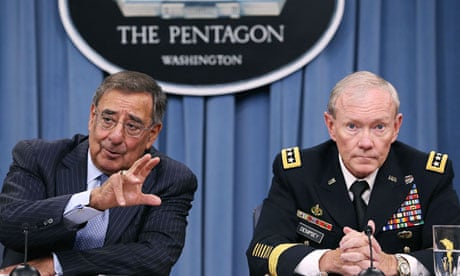The American Civil Liberties Union will go to court on Thursday in an attempt to get the CIA to hand over documents related to President Barack Obama's controversial "targeted killing" programme that uses unmanned drones to strike suspected Islamic militants.
The programme has been repeatedly referenced in public by numerous senior officials, including by Obama himself and defence secretary Leon Panetta, but the spy agency has refused to comply with a Freedom of Information Act request from the civil liberties group because it says it will not confirm the secretive use of drones.
As a result the ACLU has gone to court to argue that the CIA cannot deny the existence of a programme that has been so widely reported, including in great detail in off-the-record briefings by administration and agency officials. Jameel Jaffer, the deputy legal director of the ACLU, said: "It is preposterous. The assertion that this programme is a secret is nothing short of absurd.
"For more than two years, senior officials have been making claims about the programme both on the record and off. They've claimed that the programme is effective, lawful and closely supervised. If they can make these claims, there is no reason why they should not be required to respond to [FOIA] requests."
The so-called targeted killing programme has become one of the most controversial aspects of Obama's national security policy. It has been used in countries such as Pakistan, Afghanistan, Yemen and Somalia to strike at suspected terrorists and their supporters. Proponents of the programme say attacks can be highly accurate and come at little risk to American forces as there is no need for ground forces. Critics point out that there often civilian casualties and little is known about how targets are identified and targeted.
The London-based Bureau of Investigative Journalism tracks the strikes and has calculated that there have been 344 CIA drone hits in Pakistan alone since 2002, killing up to 3,325 people, including 881 civilians. Another area of concern is the use of drones to kill American citizens, such as radical American cleric Anwar al-Awlaki and his 16-year-old Colorado-born son. Both died in drone strikes in Yemen and relatives have sued top Pentagon and CIA officials for damages.
The ACLU's demand for details of the programme – including documents related to its legal justification drawn up by the department of justice – is aimed at prompting a national debate on the scope of the drone programme and how it is used. Its legality is a particular issue. The memorandum justifying the legal basis for the targeted killing has now been requested by at least 10 members of Congress and three different lawsuits but it remains so secret that that acknowledging its existence is a classified matter. "The public has a right to decide for itself whether or not the programme is lawful or moral," Jaffer said.
Some legal and security experts agree and believe that the current boom in drone warfare is only like to increase the demand for greater openness about how and why the weapons are used. Professor Amos Guiora, a national security and legal expert at the University of Utah, said: "Given that the drones are the warfare of the future you need a public debate about what's being done in the public's name."

Comments (…)
Sign in or create your Guardian account to join the discussion